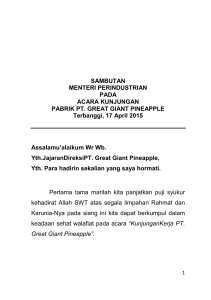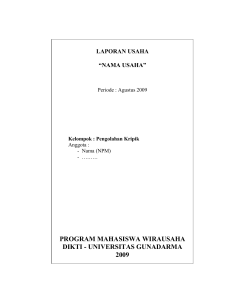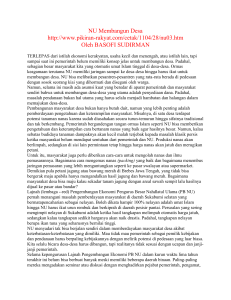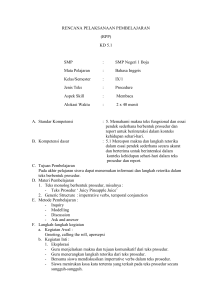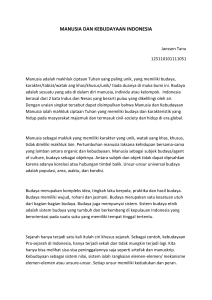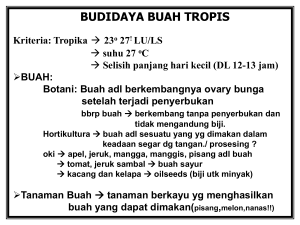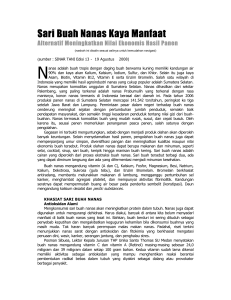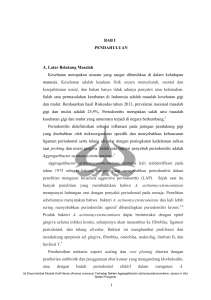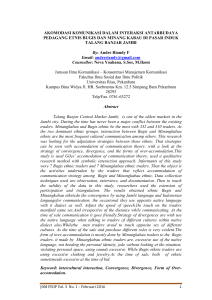MODAL SOSIAL ETNIK BUGIS DALAM MENGEMBANGKAN
advertisement
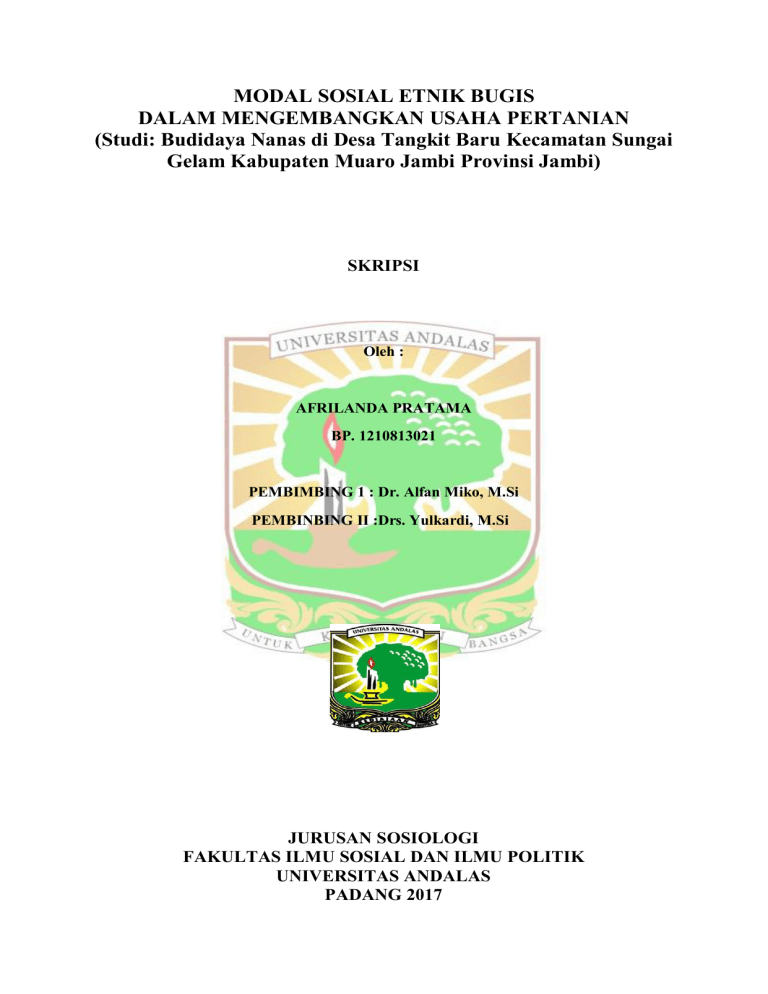
MODAL SOSIAL ETNIK BUGIS DALAM MENGEMBANGKAN USAHA PERTANIAN (Studi: Budidaya Nanas di Desa Tangkit Baru Kecamatan Sungai Gelam Kabupaten Muaro Jambi Provinsi Jambi) SKRIPSI Oleh : AFRILANDA PRATAMA BP. 1210813021 PEMBIMBING 1 : Dr. Alfan Miko, M.Si PEMBINBING II :Drs. Yulkardi, M.Si JURUSAN SOSIOLOGI FAKULTAS ILMU SOSIAL DAN ILMU POLITIK UNIVERSITAS ANDALAS PADANG 2017 MODAL SOSIAL ETNIK BUGIS DALAM MENGEMBANGKAN USAHA PERTANIAN (Studi: Budidaya Nanas di Desa Tangkit Baru Kecamatan Sungai Gelam Kabupaten Muaro Jambi Provinsi Jambi) SKRIPSI Tugas untuk Mencapai Gelar Sarjana Ilmu Sosial Pada Fakultas Ilmu Sosial Ilmu Politik Universitas Andalas Oleh AFRILANDA PRATAMA BP. 1210813021 JURUSAN SOSIOLOGI FAKULTAS ILMU SOSIAL DAN ILMU POLITIK UNIVERSITAS ANDALAS PADANG 2017 ABSTRAK AFRILANDA PRATAMA, 1210813021. Jurusan Sosiologi, Fakultas Ilmu Sosial dan Ilmu Politik, Universitas Andalas, Padang. Judul Skripsi: Modal Sosial Etnik Bugis dalam Mengembangkan Usaha Pertanian (Studi: Budidaya Nanas di Desa Tangkit Baru Kecamatan Sungai Gelam Kabupaten Muaro Jambi Provinsi Jambi). Pembimbing I Dr. Alfan Miko, M.Si. Pembimbing II Drs. Yulkardi, M.Si. Desa Tangkit Baru memiliki masyarakat homogen yang secara umum dihuni oleh penduduk etnik Bugis Wajo. Komoditi nanas menjadi sumber pendapatan utama penduduknya dalam memenuhi kebutuhan ekonomi. Komoditas nanas ini menjadi identitas Desa Tangkit Baru sehingga menjadikan desa ini menjadi desa sentra agropolitan dan sebagai produsen nanas terbesar di Provinsi Jambi dengan luas areal tanam mencapai sekitar 800 hektare. Budidaya nanas ini sudah dikembangkan sejak tahun 1970. Untuk dapat mengembangkan dan mempertahankan usaha budidaya nanas ini tidak hanya dibutuhkan modal fisik, finansial dan manusia saja namun juga dibutuhkan modal sosial yang dapat menjadi sumber energi bagi masyarakat dalam menjalankan usaha. Selain itu juga terdapat norma, budaya dan nilai pada masyarakat etnik Bugis yang dapat menjadi sumber dari modal sosial. Terdapat tiga unsur dari modal sosial yaitu kepercayaan, jaringan sosial dan norma. Oleh sebab itu, tujuan dari penelitian ini adalah mendeskripsikan modal sosial masyarakat etnik Bugis dalam mengembangkan usaha budidaya nanas di Desa Tangkit Baru. Penelitian ini menggunakan teori modal sosial yang menjelaskan kepercayaan, jaringan sosial, serta norma pada masyarakat etnik Bugis dalam mengembangkan usaha budidaya nanas di Desa Tangkit Baru. Penelitian ini menggunakan metode kualitatif dengan tipe penelitian deskripsi. Pengumpulan data dilakukan dengan obeservasi dan wawancara. Informan penelitian diambil secara purposive sampling (secara sengaja). Hasil penelitian ini menunjukkan bahwa terdapat unsur modal sosial dalam mengembangkan usaha budidaya nanas yang secara tidak langsung bersumber dari nilai, budaya dan norma pada masyarakat etnik Bugis di Desa Tangkit Baru. Modal sosial ini terdiri dari assimellereng sebagai bentuk kepercayaan yang dimiliki antar sesama petani, distributor, buruh tani, pelanggan dan pemerintah desa yang terbentuk atas dasar ikatan kekeluargaaan, ikatan kesukuan, kejujuran dan kerjasama yang terjadi secara terus menerus. Bentuk jaringan sosial dalam mengembangkan usaha budidaya nanas adalah jaringan duaan ganda berlapis karena petani nanas tidak hanya bekerjasama dengan satu aktor saja namun juga dengan aktor lainnya. Norma yang terdapat dalam mengembangkan usaha adalah alempureng sebagai nilai kejujuran, ade’ akkalabinengeng sebagai memenuhi kewajiban dan hukum adat tentang lingkungan. Kata Kunci: Modal Sosial, Etnik Bugis, Budidaya Nanas, Petani ABSTRACT AFRILANDA PRATAMA, 1210813021. Department of Sociology, Faculty of Social and Political Sciences, Andalas University, Padang. Title of Thesis: Social Capital on Bugis Ethnic Agribusiness Development (Study: Cultivating Pineapples in Tangkit Baru Village Sub District of Sungai Gelam District Muaro Jambi Jambi Province). Supervisor I, Dr. Alfan Miko, M.Si. Supervisor II, Drs. Yulkardi, M.Si. Tangkit Baru village have a homogeneous society in general are populated by ethnic Bugis Wajo. Commodity pineaplle into a main source of income for the community in meeting the needs of the economy. This pineapple commodities into the identity of the village Tangkit Baru making this village became the centre of the village of agropolitan and as producer of the biggest pineapple in Jambi Province with an area of planting acreage reached around 800 hectares. Pineapple cultivation has been developed since 1970. To be able to develop and maintain this pineapple cultivation not only required physical capital, financial and human capital but also required social capital that can be a source of energy for the community in doing business. There is also the norm, cultures and values at Bugis ethnic communities that could be the source of the emergence of social capital. There are three elements of social capital: trust, social network and norms. Therefore, the purpose of this study is to describe the social capital of the community of ethnic in developing pineapple cultivation in the village Tangkit baru. This research use the theories of social capital that explains the trust, social networks, as well as the norm of the Bugis ethnic communities in developing the cultivation of pineapple in the village of Tangkit Baru. This study uses qualitative methods of research type description. Data collection is done by observation and interviews. Informants research taken as a purposive sampling. The results of this research show that there are elements of social capital in developing the cultivation of pineapple that is indirectly derived from the values, culture and norms on ethnic Bugis community in the village of Tangkit Baru. Social capital consists of assimellereng as a from of trust that owned between fellow farmers, peasants, distributors, customers and government of the village formed on the basis of family ties, the same culture, honesty and cooperation that occurs continuously. Form of social networking in developing pineapple cultivation is a pair of network double layered pineapple farmers because not only cooperated with one actor alone but also by other actors. The norms contained in the developing efforts is alempureng as the value of honesty, ade’akkalabinengeng as fulfilling the obligation and the customary law of the environment. Keywords : Social Capital, Ethnic Bugis, Pineapple Cultivation, Farmers

